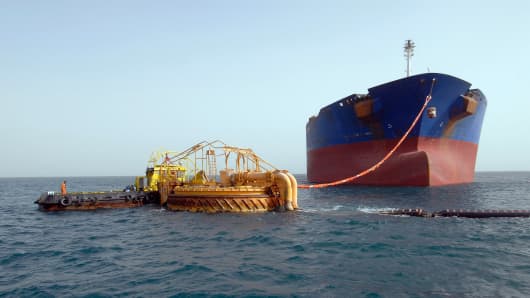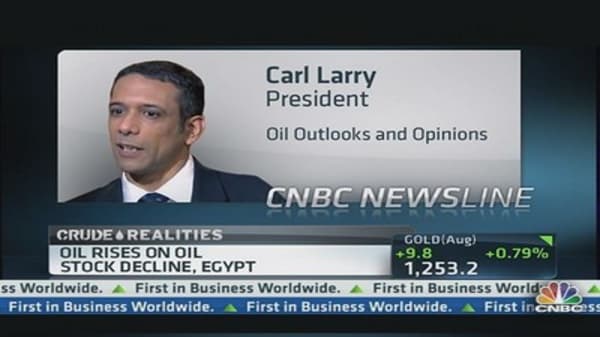Concerns that a political crisis in Egypt could disrupt oil supplies from the Middle East should linger for a while and could boost crude a further $4 to $5 a barrel if violence continues, analysts say.
U.S. oil prices climbed above $102 a barrel to levels not seen since May 2012 on Wednesday, while Brent crude oil futures hit a two-week high just above $106 and held within sight of that level in European trade on Thursday.
(Read More:
US Oil Hits 14-Month High Above $100 a Barrel
)
"If we were to see any disruptions to supply we could see Brent go to $110 per barrel this month, we may even see it this week," said Sandu Avtar, senior manager of commodities at Singapore-based financial services firm Phillip Futures.
"WTI [West Texas Intermediate oil] prices could stretch to $106 per barrel if the crisis is prolonged," he added.
Egypt's energy infrastructure is vital to transporting oil supplies around the world. It is home to major pipelines such as the Sumed pipeline, and the Suez Canal - one of the world's busiest shipping lanes.
That's why the turmoil in Egypt has unnerved oil markets. On Wednesday, the military ousted President Mohamed Morsi, but tens of thousands of his supporters, including the Muslim Brotherhood that backed him, rallied to protest against his removal.
(Read More:
Ouster Brings Cheer in Egypt, but Caution in Markets
)
"Now the ball is in the court of the Muslim Brotherhood. If they take it [the military ousting] lying down and a new democracy comes in that should stabilize things," said Avtar.
Victor Shum, vice president of Asia-Pacific at research house IHS Energy Insight, said the crisis in Egypt has injected a "geopolitical premium" into the price of oil.
"In the broader market, the supply of oil is outpacing demand so pricing ought to be low… A large part of the volatility has been the uncertainty, investors are in wait and see mode," he said.
Shum said a spike in Brent crude to $110 per barrel and WTI to $106 per barrel was "within the realms of possibility."
"If violence gets more severe, or it spreads to other countries…. or if a vessel passing through the Suez Canal gets disrupted, or even if there is a perception of a disruption, we could see a spike," he said.
(Read More:
Want to Short Oil? Good Luck!
)





